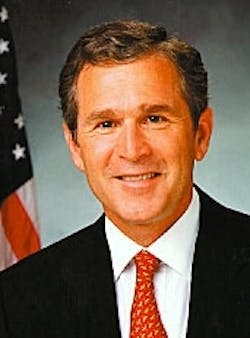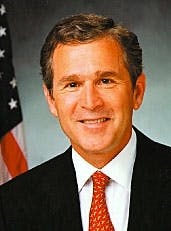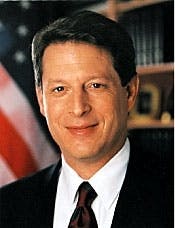Energy a hot-button issue in US presidential election campaign
Energy has become a hot-button issue in the US presidential election race between Republican Party nominee and Texas Gov. George W. Bush and Democratic Party nominee and US Vice-Pres. Al Gore.
There is scarcely another issue that so dramatically illustrates the ideological divide between the two front-running candidates for US president.
And with public ire rising over high oil and natural gas prices and concerns mounting over ample stocks of heating oil and natural gas-particularly in the US Northeast, where a number of states are considered possible swing states in the election-energy could itself become one of the swing issues in the presidential election (see Watching Government, p. 22).
On Sept. 29, Bush proposed more than 20 energy policy initiatives that he said would decrease US dependence on foreign oil imports. Several of the measures were keyed to a proposal to allow exploration on the Arctic National Wildlife Refuge (ANWR) Coastal Plain east of Prudhoe Bay oil field in Alaska.
That same day, Gore assailed his opponent's energy policy initiatives. He followed that attack by saying he would "make the right choices to ensure an affordable energy supply and protect the environment" and would prohibit oil companies from drilling in ANWR.
While not introducing new proposals in that attack on Bush, Gore earlier this year had outlined his own energy policy proposals. And he made headlines recently with his proposal to draw down the US Strategic Petroleum Reserve in a bid to temper high oil prices-a proposal swiftly taken up and acted upon by Pres. Bill Clinton.
At that time, Bush criticized the SPR proposal as an inappropriate use of the SPR and purely a well-timed political ploy by Clinton intended to benefit his chosen successor.
Bush initiatives
Speaking in Saginaw, Mich., Bush said that several of his initiatives would be funded by his proposal to allow ANWR Coastal Plain exploration.
Bush said the policy would help low-income households pay their energy bills, improve air quality, and encourage the development of renewable and alternative fuels.
But Bush said that, because alternative sources supply less than 4% of US energy needs, he would promote access to foreign oil and the development of US oil, coal, and natural gas resources.
Bush said, "America must have an energy policy that plans for the future but meets the needs of today. I believe that we can develop our natural resources and protect our environment. We are paying a steep price for 71/2 years without an energy policy."
Bush's initiatives call for the government to:
- Expand the Low Income Home Energy Assistance Program (LIHEAP) by seeking the release of $155 million from the fund. He would funnel some federal oil and gas royalty income to LIHEAP-$1 billion over 10 years.
- Reform and hike funding for the US federal weatherization program and state energy programs, costing $1.4 billion over 10 years.
- Establish a privately managed US Northeast heating oil reserve costing $100 million over 10 years.
- Use the SPR only in times of war or major disruption in supply. And Bush would ask Congress to pass "wake up" legislation requiring the US Department of Energy to notify it when oil stocks are low.
- Develop a "North American energy policy" with Canada and Mexico and improve US influence and credibility with oil-producing nations in the Persian Gulf.
- Promote development of energy resources in areas outside of the Organization of Petroleum Exporting Countries, such as the Caspian Sea Basin and western and southern Africa.
- Hold an annual meeting of G-8 (Group of Eight) energy ministers, or their equivalents, to encourage international energy cooperation.
Production response
Bush said he would open the ANWR Coastal Plain to exploration, "which could replace the oil that the US now imports from Iraq." The area to be leased was described as only 8% of the entire refuge.
His administration would examine whether certain promising natural gas-prone lands on federal lands should be opened for exploration.
The plan advocated "improving the regulatory process to encourage more refining capacity." It would also require federal agencies to develop a comprehensive policy for approving pipelines.
Over 10 years, it would invest $2 billion to fund research in "clean coal" technologies and $1 billion to establish clear rules to help efficient utilities purchase nuclear plants.
His policy would expedite the relicensing process for hydroelectric projects and would oppose the breaching of dams. The policy would also support federal legislation restructuring the electric utility industry.
Environmental measures
Bush would propose legislation to require electric utilities to reduce harmful emissions.
The proposed policy would establish a "Royalties Conservation Fund," earmarking "potentially billions in royalties from new oil and gas exploration in ANWR to fund conservation efforts." It would designate an estimated $1.2 billion of bid bonuses from an ANWR lease sale for funding research into alternative energy resources.
And it would support tax credits for electricity produced from renewable and alternative fuels at a cost of $1.4 billion over 10 years.
Broadside at White House
In his speech, Bush blistered the Clinton administration for its "lack of leadership" on energy issues.
Instead of encouraging new energy supplies, Bush noted, the administration has hiked gasoline taxes and "consistently advocated policies that would generate higher oil and gas prices."
The administration has focused domestically, Bush claimed, on developing renewable energy resources and replacing the internal combustion engine, while discouraging energy exploration, production, and development within the US.
He also accused the administration of failing to maintain the Persian Gulf war coalition his father, Pres. George Bush, had cobbled together to expel Iraqi forces from Kuwait, which "has squandered US credibility with oil-producing nations in the Persian Gulf that can influence OPEC policies.
"This leadership failure has increased Iraqi leverage of the US and international economies."
Citing the surge in oil prices and winter energy supply concerns, Bush contends the administration failed to take action even after the US Energy Information Administration reported that crude oil and refined product stocks had fallen below normal levels as long ago as December 1999.
"As a result, high heating oil and gasoline prices are now impacting millions of Americans."
Bush charged that the administration, "in the absence of a comprehensive [energy] policyellipserecently decided to use a key national security resource-the Strategic Petroleum Reserve-to address short-term price problems for political gain."
Gore's response
Perhaps the most telling aspect of Gore's energy policy proposals can be ascertained by a glance at the list of speeches, organized by category, on his official campaign website: all speeches referring to energy are incorporated in the Environment category group; there is no Energy category.
In his speech at Chevy Chase, Md., also on Sept. 29, Gore blasted Bush and his running mate and former chairman of oil services giant Halliburton Co., Dick Cheney: "Instead of offering real policies to improve energy security and protect the environment, George W. Bush and Dick Cheney would let oil companies drill in Alaska's wildlife preserve-one of the country's natural treasures.
"I believe that we don't have to degrade our environment in order to secure our energy future. I believe that we shouldn't invade precious environmental treasures-like the Arctic National Wildlife Refuge-in the pursuit of an energy solution that would take years to implement, and in the end, would yield just months of increased oil supply."
In keeping with his earlier attacks on Bush and Cheney for their links to the petroleum industry, the press release of Gore's speech proclaimed his opposition to "Bush's plans to let Big Oil drill Alaska's Natural Wildlife Refuge."
Gore's energy proposals
Gore contends his long-term energy plan would ensure clean and reliable sources of energy and reduce reliance on foreign oil-"without sacrificing the country's environmental treasures"-by investing in new technology.
Gore's energy initiatives focus on:
- Fuel-efficient vehicles. Gore proposed to give US consumers a tax credit of up to $6,000 for the purchase of more fuel-efficient cars or sport utility vehicles, a credit of up to $5,000 for the purchase of fuel-efficient pickups or other trucks, and up to $15,000 for more fuel-efficient 18-wheelers.
- Energy-efficient homes and businesses. He proposed a tax credit of up to $2,000 to allow consumers to buy energy-efficient new homes or upgrade the efficiency of their current homes. He would extend a 20% tax credit to businesses for the purchase of energy-efficient building equipment and the current 10% tax credit for homes or business that use solar energy to generate electricity or heat water. Gore's plan would help low-income families insulate their homes and upgrade heating and cooling systems. The plan would support users of natural gas, fuel oil, and LPG, as well as users of electric energy. And Gore proposed a competition to select 20 communities that develop a comprehensive plan to reduce pollution and greenhouse gas emissions while stimulating economic growth and creating new jobs.
- Alternative transportation. Gore would make new investments in light rail systems, cleaner buses, and high-speed trains that are intended to not only help end US dependence on foreign oil but also cut traffic and reduce smog.
- Investment in new technology. Gore would expand investment in the Small Business Innovation Research Program and the Advance Technology Program to help bring new energy-efficient and environmental technologies to the marketplace. Through the "Technologies for Tomorrow" challenge, Gore would work with businesses to encourage innovative solutions with new tax incentives.
- Tax cuts to promote alternative energy sources. Gore would double the tax credit for operating costs associated with generating electrical energy through wind, biomass, and other methods.
Attacking oil industry
Much of the Gore focus on energy issues has targeted the petroleum industry and a proclaimed need to move to more-stringent conservation and renewable fuels standards.
He dubbed this initiative the "Energy Security and Environment Trust."
In a speech earlier this year, he said, "We can have a next-stage prosperity where you don't have to build your lives around a fuel source that is distant, uncertain, and easily manipulated. We will demand and develop new technologies to free ourselves from gas-tank price-gouging, and we will sell those technologies to the world. We'll build a new generation of fuel-efficient vehicles, and then make it easy for families to afford them."
In a speech Gore gave while putting forth his SPR drawdown proposal in mid-September, he said, "America's energy resources shouldn't be so reliant on others, so subject to shortages, so vulnerable to big oil interests with a disregard for the public interest."
He also accused oil companies of profiteering, citing his own call earlier this summer for a federal investigation of concentration, noncompetitiveness, and pricing practices in the oil industry.
"You ought to have the choice to get in your car, turn on your engine, and go where you want-at a reasonable price to you and your family," Gore said in that mid-September speech. "If I'm entrusted with the presidency, I will work toward the day when we are free forever from the dominance of big oil and foreign oil."


